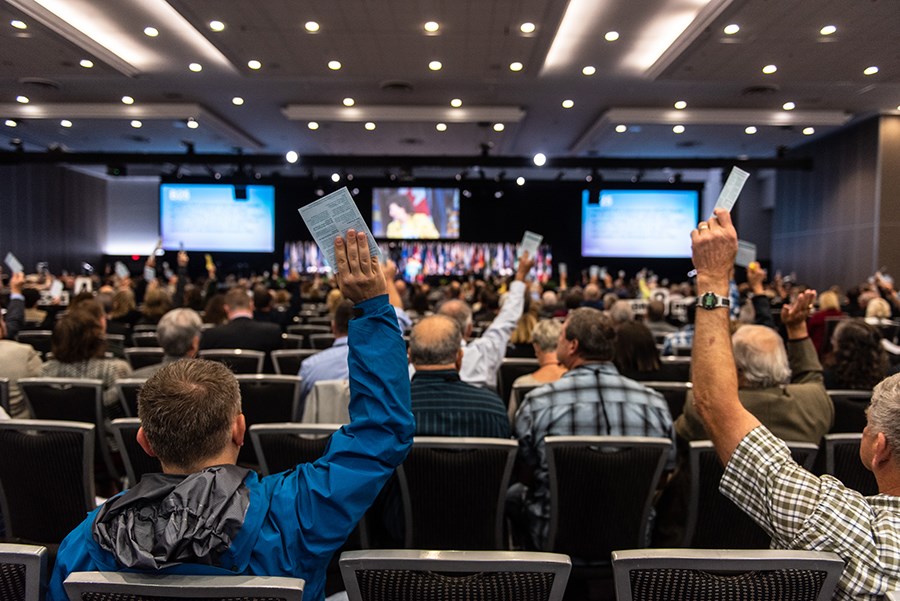Municipalities throughout the province affirmed three resolutions put forth by Squamish council during the Union of B.C. Municipalities convention held last week.
"All [motions] had a positive response, which is fantastic," Mayor Karen Elliott told The Chief.
They were resolutions that concerned the climate, e-bikes, and BC Rail.
A fourth measure calling for consistent search and rescue funding wasn't adopted per se, but the "sentiment" of it was incorporated into alternate UBCM resolutions that passed, Elliott said.
Motions passed at the UBCM aren't binding, but are used as lobbying tools to let the provincial government know what municipalities are asking for.
They do carry some weight, as they represent the wishes of many communities throughout the province.
Member municipalities can pitch a resolution to the union, which then deliberates on whether to endorse them or not.
Climate change was a significant theme that pervaded the convention. Multiple resolutions regarding this issue were passed, including one that was first formed in Squamish municipal hall chambers.
Resolution B141 called upon all levels of government to recognize the "climate emergency" and to ramp up their efforts to fight climate change.
It asked for the provincial government to establish a carbon budget in line with limiting global warming to 1.5 C, the threshold outlined by the United Nation's Intergovernmental Panel on Climate Change.
Embedded in the resolution were also requests for an annual report on the province's remaining carbon budget, as well as the creation of a working group to help transition away from fossil fuels.
This motion was first proposed by Coun. Chris Pettingill.
In another Squamish motion that has an environmental bent, UBCM delegates affirmed a resolution that asked Victoria to remove provincial sales tax charges for electric bicycles.
The rationale behind the motion was that since the provincial government was already encouraging greener forms of transportation, such as electric vehicles, eliminating PST on e-bikes would be a step in that same direction.
This idea was first floated by Coun. Armand Hurford at a Squamish council meeting, who then recused himself because he owns Republic Bicycles, which could benefit from such a motion.
Coun. John French then took it upon himself to spearhead the motion.
Squamish also put forth a motion asking the province to change the mandate of BCR Properties so that it disposes of surplus lands with consideration to local government. It was approved by UBCM delegates.
BCR Properties was a division of BC Rail that was given the mandate to sell its properties in 2004 and has been systematically doing that since then. Generally, the guiding principle has been to get the best price out of each sale. However, adding municipalities' concerns could change how sales are done.
The resolution asks that the province take into account municipalities' need for critical infrastructure, environmental needs, community recreation and economic development, as well as for social needs such as affordable housing lands at significantly less than fair market value prices.
This was an idea that was first put forth by Coun. Eric Andersen.
There were three other highlights that were of particular interest to Squamish presented at the UBCM.
While they weren't put forth by Squamish at this year's UBCM convention, they've been ongoing issues that have been on the municipality's radar for some time.
The first called for dedicated funding with respect to sexual assault clinics.
This issue has been prominent in Squamish because so-called "rape kits" only became accessible in town in 2015 — and are still not offered full-time.
Those needing such resources outside of business hours still have to travel to the Vancouver area.
Elliott said that Sea to Sky Corridor is expecting to get 24/7 access to the kits in the near future, though a firm date has yet to be set.
However, she noted that in more remote communities, it's still an issue.
"Asking a woman to travel outside her community for forensic evidence collection and to get that emotional and counselling support is disrespectful and challenging for the woman and most, therefore, don't do it, and so these sorts of crimes are underreported," said Elliott.
"It's not just the Sea to Sky Corridor that struggles with that, but small communities around the province."
There was also an announcement from Victoria Mayor Lisa Helps, regarding the city's plan to ban plastic bags.
While the latest court ruling has nullified the municipality's effort to get rid of the bags, Helps said that Victoria will be appealing to the Supreme Court of Canada.
It's unclear whether the court will hear this case, though Squamish did throw its support behind the city.
"I think what's important about standing up and supporting Victoria is that this challenge is about more than single-use plastics or plastic bags," said Elliott.
"The reading of this court case suggested that our powers as local government may be limited in setting business regulations, and that's something that should be challenged."
A motion regarding climate accountability was put forth by Port Moody — not Squamish — but it was concerning an initiative that the District had previously expressed interest in.
In September last year, the Squamish's previous council promised to support a climate accountability campaign spearheaded by activist groups including Squamish's My Sea to Sky.
The idea of climate accountability is to get fossil fuel companies to pay for the costs of climate change.
Squamish promised to write a letter in support of this movement in September 2018. However, since then, Elliott said the municipality has shelved that plan.
"I believe our most fundamental work is to get our own house in order... and develop our plans, then look at whether it's appropriate to send the accountability letter," she said.
This initiative was put forward at various conventions and the UBCM was no exception. However, it did not gain any traction in this conference. UBCM delegates did not endorse the motion.
— Who met with whom? —




